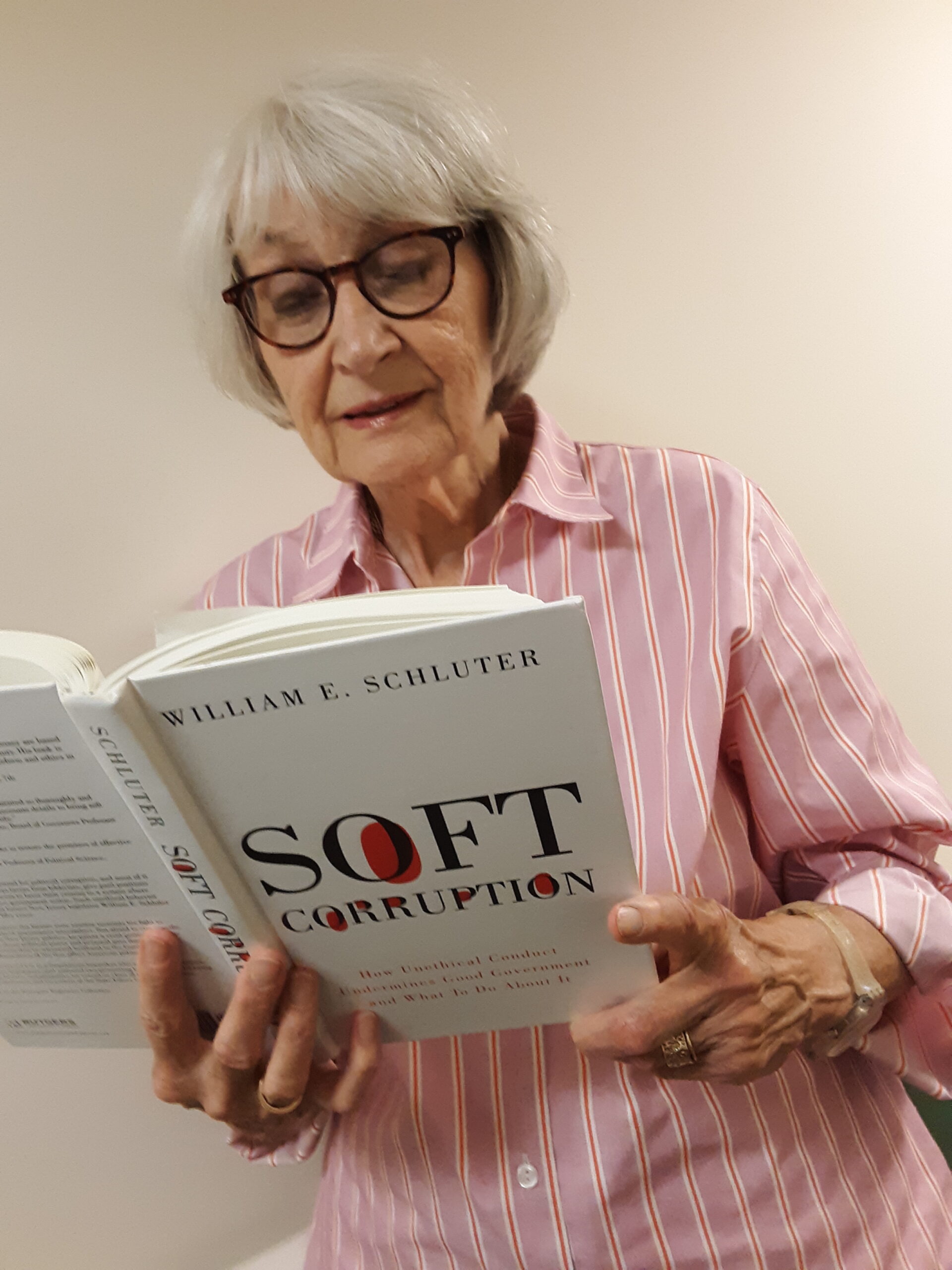My phone buzzed with a news alert when I was about to go into Labyrinth Books on Nassau Street in Princeton to buy the book, “Soft Corruption.”
I had to read the book before I interviewed the author, William E. Schluter, the former Republican lawmaker who had served in both houses of the New Jersey Legislature, and who grew up in Princeton, graduated from Princeton University (class of 1950), and raised his family in Pennington.
My phone, however, delivered the very sad news that Bill Schluter had died on Monday, Aug. 6, 2018.
His, “scheduler” decided that perhaps my interview with the 90-year-old would be superfluous, considering the volumes of words and effusive praise already spoken and written about New Jersey’s Super Hero of Ethics.
Bill Schluter spent his entire life not just railing against acts of (mostly) legal “soft” political corruption among elected officials in government, but more importantly trying to do something about it. He authored pioneering laws regulating lobbying and campaign finance, was chairman of the Citizens Clean Elections Commission, and served on the State Ethics Commission.
He defined soft corruption as unethical – but for the most part, legal – “transgressions carried out in the quest for political power or personal benefit, achieving results that work against the public interest.”
Like a true super hero, he never lost sight of his mission and fought with his sword of words and legislative actions until the day he died.
When I first interviewed him decades ago at a Princeton University reunion (it may have been his 35th reunion), he spoke to me about how ethical behavior was the infrastructure that supported democracy.
I last saw Bill Schluter a few months ago at the launch of Gov. James Florio’s book, “Standing on Principle.” Without giving any indication of his illness, he offered great praise for Gov. Florio’s willingness to do the right thing for New Jerseyans, even though, politically it may have been the wrong thing.
Since I never got a chance to talk to him directly about his book, I decided that the best way to keep broadcasting his mission to obtain ethical and effective democratic (small “d”) government was to interview Ingrid Reed, a longtime Princeton resident and renowned New Jersey public policy expert.
As former director of the New Jersey Project at the Eagleton Institute, Ingrid connected with Bill Schluter and his mission on both a personal and professional level over the course of many decades. Ingrid was one of the friends he thanked in the “acknowledgement” portion of the book. Their friendship was evident, when she led a conversation with Bill Schluter at the Princeton Public Library in June 2017.
“I think he may have been motivated to write the book when he knew he was battling (pancreatic) cancer,” said Ingrid, who indicated that the book would be his final attempt at curing New Jersey of its governmental ethical cancer.
At the standing-room-only library event, the theme of the discussion was elected officials’ self- interest versus public interest.
“He wanted government to be fair – he did not just preach it, he lived it, and he saw his mission to change the rules to remove the incentives for actions of self-interes,” she said. “By presenting stories of soft corruption, Bill wanted … to motivate citizens into demanding that public officials live up to the ‘public’ in their title and act first and foremost in the public’s interest.”
Bill Schluter was specific about what has to be done: eliminate senatorial courtesy, dual office-holding, influence peddling by lobbyists, patronage abuses, partisan redistricting, wheeling of campaign funds, challenge control of political money by powerful leaders.
Ingrid pointed out that Bill Schluter’s passion for reform never devolved into denigrating or bullying behavior. His focus was on reforming the system. Furthermore, she said, he knew how to listen.
“I always had heard about Bill Schulter,” she said. “He ran in our district, and simply as a constituent, I watched him and read about him for many years. But it was when I started at Eagleton in 1996 that I had the opportunity to talk with him on a regular basis. I learned so much from him, but I was honored to find that he was genuinely interested in listening to me and getting the perspective of a lifelong Democrat. Politics didn’t matter, people mattered.”
Ingrid seems to be an appropriate disciple of Bill’s ethics doctrine. She is a founder and current board chair of NJ Spotlight; a founder and board member of NJ Future; a member of the NJ AARP Advocacy Committee; and a member of Trenton Mayor Reed Gusciora’s Transition Committee. In the past, she served on New Jersey’s Help America Vote Act (HAVA) committee on election reform and chaired the Local Government Ethics Reform Task Force in the Corzine and Christie administration.
Most recently, Ingrid and her husband, former Princeton Borough Mayor Marvin Reed, were recognized for their decades of working on behalf of the public interest rather than their own interest with the receipt of the Leslie “Bud” Vivian Community Service Award, administered by the Princeton Area Community Foundation.
Thank you, Marvin and Ingrid, for choosing a life of public service and carrying out your responsibilities in accordance with the Schluter principles. Perhaps the best way to thank them is by reading “Soft Corruption”– which I just did, and giving it your children and grandchildren – which I just did.

